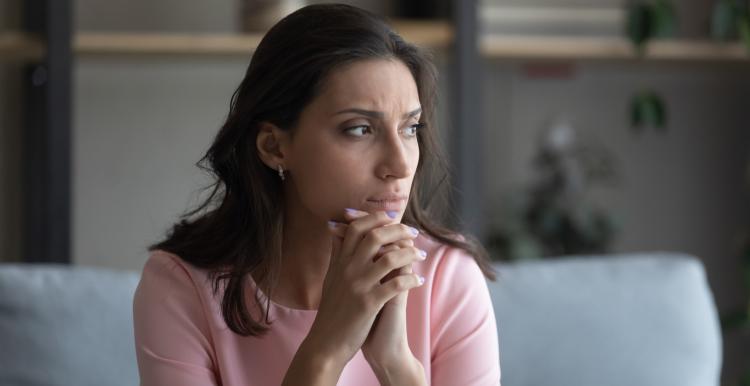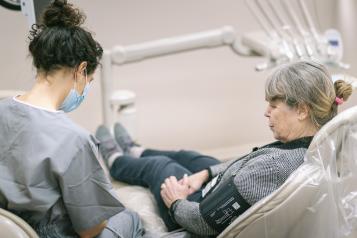Menopausal Women call for improved GP training

In our latest Report Let’s Talk about the Menopause: The Views and Experiences of Women living in Hertfordshire, some respondents told us perimenopause/menopause care was a “lottery”, with some areas and GP practices providing excellent support including specialist menopause clinics, but others needing improved awareness and training.
Why did we do this research?
The Hertfordshire and West Essex Integrated Care Board (ICB) Primary Care Board asked Healthwatch Hertfordshire to investigate the experiences of perimenopausal/menopausal women when accessing GPs.
Between May and July 2023, we heard from 560 women* who were either going through, or had experienced, the menopause**. We aimed to find out:
- If women going through the menopause were seeking help from primary care services and if not, the reasons for this.
- To explore whether women were being diagnosed with the menopause and if the treatment they were getting was appropriate and timely.
- If women trust their GP and feel supported with menopause.
- To find out what information, care, and treatment women want during the menopause.
*Trans and non-binary people can experience the menopause. However, we only had those who identify as a woman filling in this survey, so the term ‘woman’ has been used throughout.
** Where possible, we will use the term menopause to refer to both perimenopause/menopause for simplicity throughout the rest of this article.
What did women tell us?
The menopause is when a woman’s periods stop due to lower levels of a hormone called oestrogen. The menopause typically occurs between the ages of 45 and 55, with the average age being 51 years old in the UK. However, 1 in 100 people will experience menopause before the age of 40 years. The perimenopause is when someone has symptoms of the menopause but their periods have not stopped.
Currently, GPs receive no formal training on the menopause, which can result in some women being misdiagnosed or receiving inadequate support to treat their symptoms.
Our research found:
- Many respondents delayed getting help for their menopause symptoms. Only 8% sought help for the menopause immediately. 31% sought help within 6 months and 32% sought help in a year. Concerningly, 22% sought help within 5 years and 5% within 10 years.
- 52% of women had to speak to healthcare professionals about their menopause symptoms multiple times. Many spoke to several different doctors before they were taken seriously and some were initially misdiagnosed.
- Some women said they had such a poor experience, it prevented them getting further help, despite having severe symptoms. Concerningly, a few were told by healthcare professionals what they were going through was a part of life, refused treatment and told to just “get on with it”.
- Women going through early menopause found it harder to get diagnosis and support. Some respondents said they were unaware that women could start the perimenopause in their 30s/40s.
- Positively, 12% of respondents said HRT was being prescribed more quickly than in the past – which for many was important in helping them to manage their symptoms.
- 79% looked for advice, information or support from NHS services to help with the menopause.
- Respondents felt more individualised treatment was needed, since experiences of the menopause could vary enormously between women.
Specialist services
A few respondents told us about some Herts GPs who were specialising in women’s health, particularly the menopause. Those who had spoken to such a GP specialist often had a more positive experience, receiving the support and care they needed in a timely manner, while being treated with more respect and empathy.
It was suggested that healthcare professionals could be more proactive in discussing the menopause with patients, particularly during routine check-ups and NHS Health Checks. Some felt introducing a “menopause” consultation could be beneficial.
Linked to this, some respondents said they would like to see the provision of menopause clinics and a greater number of healthcare professionals to specialise in the menopause and women’s health.
A few GP practices in Hertfordshire have launched support groups/workshops, which appear to have been successful.
What happens now?
We heard numerous reports of women visiting healthcare services multiple times and seeing many GPs before getting a diagnosis, leaving women feeling lost, confused and unsupported.
Although many NHS services are starting to make improvements in supporting women during the menopause, respondents called for greater education, information and training for healthcare professionals, as well as more compassion, empathy and respect.
Our Report recommends:
- Clinical staff should receive more training, information and education on the menopause, adopting best practice where possible.
- Clinicians should treat women going through the menopause with kindness, respect and take their concerns and symptoms seriously.
- Clinicians should take younger women seriously when they come in with menopause symptoms.
- Clinicians should discuss the menopause at routine check-ups and NHS Health Checks.
- Clinicians should provide care that is personalised and specific to the individual and take a more holistic approach to treating the menopause.
- Clinicians should provide information and resources in health settings, which outline the signs of menopause and what support NHS healthcare providers can offer.
- Signposting to local/national groups and charities supporting women during the menopause.
- Every GP practice should work toward having a healthcare professional who specialises in the menopause/women’s health.
Downloads
Read the full Report here.


